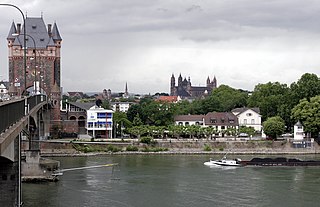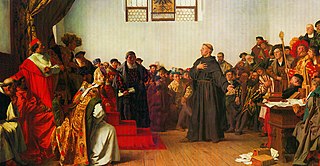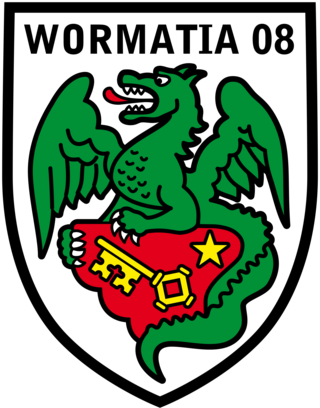External links
- (in German) Official site
| Personal information | |||
|---|---|---|---|
| Date of birth | July 9, 1981 | ||
| Place of birth | Worms, West Germany | ||
| Height | 1.84 m (6 ft 0 in) | ||
| Position(s) | Defender | ||
| Team information | |||
Current team | Wormatia Worms | ||
| Number | 22 | ||
| Youth career | |||
| Wormatia Worms | |||
| ?–1995 | TSG Pfeddersheim | ||
| Senior career* | |||
| Years | Team | Apps | (Gls) |
| 1995–2001 | 1. FC Kaiserslautern | 2 | (0) |
| 2001–2002 | 1. FC Saarbrücken | 20 | (0) |
| 2002–2003 | SV Wacker Burghausen | 16 | (0) |
| 2004–2007 | Sportfreunde Siegen | 66 | (1) |
| 2007–2008 | SV Sandhausen | 40 | (1) |
| 2009–2010 | FC Erzgebirge Aue | 36 | (1) |
| 2010– | Wormatia Worms | 40 | (1) |
| International career | |||
| 1999–2001 | Germany U-21 | 30 | (0) |
| *Club domestic league appearances and goals | |||
Marco Stark (born July 9, 1981 in Worms, Germany) is a German football player currently playing for Wormatia Worms.

Rhineland-Palatinate is a western state of Germany. It covers 19,846 km2 (7,663 sq mi) and has about 4.05 million residents. It is the ninth largest and sixth most populous of the sixteen states. Mainz is the capital and largest city. Other cities are Ludwigshafen am Rhein, Koblenz, Trier, Kaiserslautern, Worms and Neuwied. It is bordered by North Rhine-Westphalia, Saarland, Baden-Württemberg and Hesse and by France, Luxembourg and Belgium.

The Salian dynasty or Salic dynasty was a dynasty in the High Middle Ages. The dynasty provided four kings of Germany (1024–1125), all of whom went on to be crowned Holy Roman emperors (1027–1125).

Worms is a city in Rhineland-Palatinate, Germany, situated on the Upper Rhine about 60 km (40 mi) south-southwest of Frankfurt am Main. It had about 82,000 inhabitants as of 2015.
Alzey-Worms is a district in Rhineland-Palatinate, Germany. It is bounded by the district Groß-Gerau (Hesse), the city of Worms and the districts of Bad Dürkheim, Donnersbergkreis, Bad Kreuznach and Mainz-Bingen.

The Diet of Worms of 1521 was an imperial diet of the Holy Roman Empire called by Emperor Charles V and conducted in the Imperial Free City of Worms. Martin Luther was summoned to the Diet in order to renounce or reaffirm his views in response to a Papal bull of Pope Leo X. In answer to questioning, he defended these views and refused to recant them. At the end of the Diet, the Emperor issued the Edict of Worms, a decree which condemned Luther as "a notorious heretic" and banned citizens of the Empire from propagating his ideas. Although the Protestant Reformation is usually considered to have begun in 1517, the edict signals the first overt schism.

The Investiture Controversy or Investiture Contest was a conflict between the Church and the state in medieval Europe over the ability to choose and install bishops (investiture) and abbots of monasteries and the pope himself. A series of popes in the 11th and 12th centuries undercut the power of the Holy Roman Emperor and other European monarchies, and the controversy led to nearly 50 years of conflict.
Rhenish Hesse or Rhine Hesse is a region and a former government district in the German state of Rhineland-Palatinate. It is made up of territories west of the Upper Rhine river that were part of the Grand Duchy of Hesse and its successor in the Weimar Republic, the People's State of Hesse from 1816 to 1945. The hilly countryside is largely devoted to vineyards, comprising the Rheinhessen wine region.
Sasser is a computer worm that affects computers running vulnerable versions of the Microsoft operating systems Windows XP and Windows 2000. Sasser spreads by exploiting the system through a vulnerable port. Thus it is particularly virulent in that it can spread without user intervention, but it is also easily stopped by a properly configured firewall or by downloading system updates from Windows Update. The specific hole Sasser exploits is documented by Microsoft in its MS04-011 bulletin, for which a patch had been released seventeen days earlier. The most characteristic experience of the worm is the shutdown timer that appears due to the worm crashing LSASS.

The Book of Abramelin tells the story of an Egyptian mage named Abraham, or Abra-Melin, who taught a system of magic to Abraham of Worms, a Jew in Worms, Germany, presumed to have lived from c. 1362–c. 1458. The system of magic from this book regained popularity in the 19th and 20th centuries partly due to Samuel Liddell MacGregor Mathers' translation, The Book of the Sacred Magic of Abramelin the Mage.

Karl Theodor Anton Maria von Dalberg was Prince-Archbishop of Regensburg, Arch-Chancellor of the Holy Roman Empire, Bishop of Constance and Worms, Prince-Primate of the Confederation of the Rhine and Grand Duke of Frankfurt.

The Prince-Bishopric of Worms was an ecclesiastical principality of the Holy Roman Empire. Located on both banks of the Rhine around Worms just north of the union of that river with the Neckar, it was largely surrounded by the Electorate of the Palatinate. Worms had been the seat of a bishop from Roman times. From the High Middle Ages on, the prince-bishops' secular jurisdiction no longer included the city of Worms, which was an Imperial Free City and which became officially Protestant during the Reformation. The prince-bishops however retained jurisdiction over the Cathedral of Worms inside the city.

VfR Wormatia 08 Worms is a German association football club that plays in Worms, Rhineland-Palatinate. The club and its historical predecessors were regular participants in regional first-division football competition until the formation of the national top-flight Bundesliga in 1963.
Worms may refer to:

Worms is a 2D artillery tactical video game developed by Team17 and released in 1995. It is the first game in the Worms series of video games. It is a turn based game where a player controls a team of worms against other teams of worms that are controlled by a computer or human opponent. The aim is to use various weapons to kill the worms on the other teams and have the last surviving worm(s).

Ronald Worm is a German former international footballer who played as a striker.
The 1955 German football championship was the culmination of the football season in West Germany in 1954-55. Rot-Weiss Essen were crowned champions for the first time after a group stage and a final.

The Eisbach, locally known as die Eis, is a 38-kilometre (24 mi) long river and left or western tributary of the Rhine in the northeastern Palatinate and southeastern Rhenish Hesse, in the German state of Rhineland-Palatinate.

Florian Gerster is a German politician and former government official.

Jan Metzler is a German politician who represents the Christian Democratic Union (CDU) in the Bundestag, the German federal parliament. Metzler was first elected in the 2013 election, gaining the constituency of Worms, which had previously been held by the Social Democratic Party of Germany (SPD) since its creation in 1949.

The Luther Monument is a group of statues that was erected in Worms, Rhineland-Palatinate, Germany, to commemorate the Protestant reformer Martin Luther. It was designed and partly made by Ernst Rietschel, and unveiled on 25 June 1868. The monument includes a group of bronze statues on stone plinths centred on a statue of Luther, surrounded by statues of related individuals and allegorical statues representing related towns. The elements are arranged in the shape of a castle, reflecting Luther's hymn "A Mighty Fortress Is Our God".